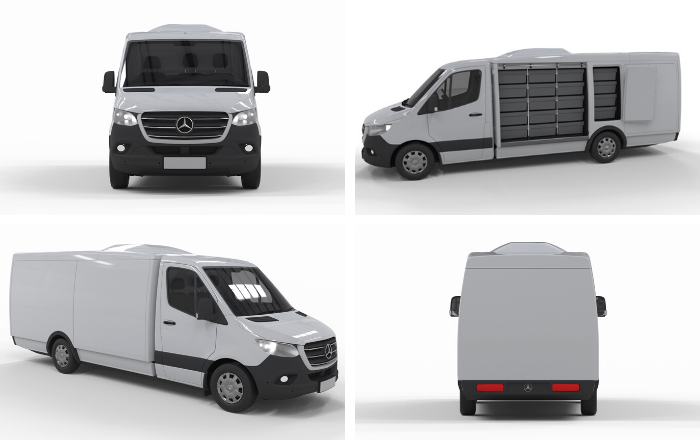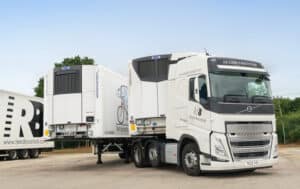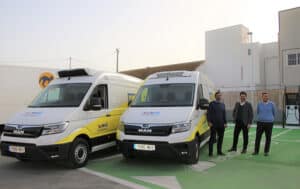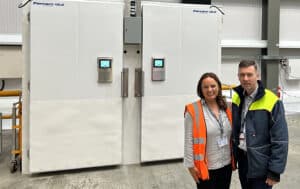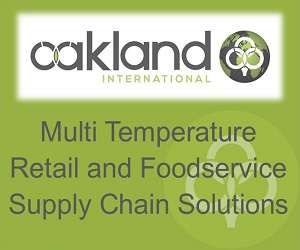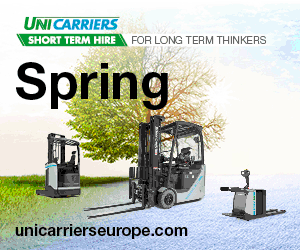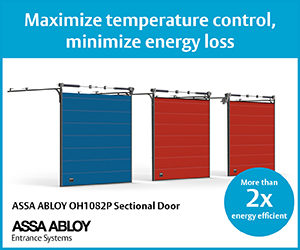A British engineering firm that works with some of the biggest brands in the aerospace and automotive sectors, including on projects with Airbus and Jaguar Land Rover, and even on the construction of the Royal Navy’s new aircraft carriers, has brought its advanced experience to commercial vehicle bodybuilding in a move that could transform the home delivery sector.
Coventry-based Penso is launching a new range of ultra-lightweight bodies for 3.5-tonne commercial vehicles which have been carefully designed to tackle all issues facing last mile logistics fleets, namely: reducing carbon footprint, driver shortage, tighter legislation, imminent technology advances in alternative fuels and, today more than ever before, increasing customer demand.
The firm’s new ‘Blue Ocean Home Delivery Pods’ offer temperature-controlled and dry freight fleets the ability to increase payload by up to 50%, and cubic capacity by as much as 30%.
Put simply, a 3.5-tonne vehicle with a Blue Ocean Home Delivery Pod can carry the same weight of goods in two journeys, that a traditional vehicle delivers in three.
This significant increase, combined with a truly aerodynamic design, improved functionality for drivers, the use of both carbon fibre and recycled plastic, compatibility with diesel, electric and hybrid chassis plus an unparalleled 10-year structural warranty, provides Penso an opportunity to radically improve home deliveries.
Crucially, the panels for Penso’s carbon fibre pods are press formed and take just minutes to construct, making the end product a commercially viable alternative for home delivery fleets for the first time. Typically, carbon fibre panels have taken hours to manufacture in an autoclave, pricing the solution out of the fleet sector.
And while the company’s launch-to-market seems timely given current conditions, its development of a cost-effective lightweight composite solution for high volume transport has been the result of more than 10 years of research and a £16.3 million investment – half from Penso and half from government matched-funding via the Advanced Propulsion Centre (APC) and Innovate UK.
A large proportion of this investment has been in developing a flexible automated robot assembly line housed in a brand new 50,000 ft2 facility in Coventry which can produce a finished body every 42 minutes.
Production is ramping up this month and next with two initial models – an e-Grocery Pod as an upgrade for supermarket deliveries and an e-Delivery Pod, based on a Luton van. Ultimately, 30 different LCV body variants will be built across different wheelbases and vehicle platforms to suit a variety of applications and fleets.
Daniel Hurcombe, Manging Director of Penso says: “We have taken an entirely fresh approach in what is typically a very traditional sector, using new materials and processes to unlock major efficiency and sustainability improvements for last mile delivery.
“Crucially, we can offer customers a clear road map to net zero emissions and dramatic improvements in total cost of ownership.”
Hurcombe adds: “Our new facility is designed to build up to 10,000 vehicle bodies per annum, and the plan is to ramp up production steadily over the next five years to fill that capacity.
“We’ve started volume production this month, following extensive prototype testing, and we already have an order book with household-name fleets for several hundred vehicles to be built this year. We are confident of significant further interest from supermarkets, parcel delivery firms and logistics fleets as doorstep demand continues to surge.”
– Blue Ocean Home Delivery Pods Available From Launch
Penso is launching its new Blue Ocean Home Delivery Pods with two body types initially, with the name reflecting the 5,000 recycled plastic bottles used to manufacture each pod, thereby helping to the reduce the volume of plastic waste ending up in the sea.
Both pods have been configured for a 3.5-tonne medium wheelbase, front-wheel-drive, Mercedes-Benz Sprinter.
Penso’s bodywork is fully compatible with diesel, electric and hybrid models – ensuring the design is future-proofed and can be easily transferred onto next-generation vehicles.
Blue Ocean e-Grocery Pod
The first Blue Ocean model is a triple compartment temperature-controlled pod for grocery home deliveries, offering the ability to carry 140 totes versus the industry standard of 110 to 120.
Penso can adapt bodywork configurations for different customers, with the launch vehicle holding 72 ambient totes, 45 chilled totes and 23 frozen totes. Its research and development teams used complex fluid dynamic analysis to ensure rapid air flow around the freezer section, guaranteeing air temperature returns quickly to the set point after door openings. High pressure at the front of the freezer block also forces cold air between the totes to penetrate the stored goods.
This model boosts payload capacity by 47% to an impressive 1,250kg versus an average of 850kg for a traditional 3.5-tonner in this sector.
Combined third-party track testing at Millbrook Proving Ground and real-world testing in a customer fleet over a mix of inner-city and suburban routes, with the GAH refrigeration unit running, returned a 34.05mpg fuel economy, based upon a weighted average.
This compares favourably with the 24mpg achieved by the existing customer vehicle – pointing to a significant improvement in fuel consumption.
Hurcombe explains: “For a typical supermarket vehicle, that equates to a saving of around £2,400 per vehicle per year in diesel costs alone. Multiply that across a fleet of 3,000 home delivery vans and suddenly you’re saving £7,200,000 a year on diesel. That’s a fairly compelling saving for a fleet manager to share with their finance and procurement teams.”
Penso has designed the pods to be compatible with all makes of refrigeration unit currently used by online grocery retailers in the UK market.
Blue Ocean e-Delivery Pod
The second Blue Ocean model will enter production in July 2020 and is an ultra-lightweight Luton van, offering 19m3 of load space and an interior height clearance of 2.4m – perfect for dry freight parcel delivery or the two-person delivery of bulk goods.
Based on the same Sprinter chassis, this model provides a payload capacity of 1,500kg, dependant on the customer’s final specification. Traditional bodies typically give a payload of 900–1,000kg in a similar application, resulting in substantial efficiency gains for operators specifying a Penso-built pod.
Future range expansion
Penso will launch additional Blue Ocean Home Delivery Pods from Q3 2020, including medium- and high-roof van body variants with a choice of single and double compartments, twin rear door and side door loading configurations and tail-lift options – customisable for temperature-controlled goods or dry freight.
– Optimum Efficiency
In addition to the up to 50% improvement in payload, up to 30% improvement in load space and around 30% reduction in fuel costs, Penso has designed the pods to be light and easy to operate for drivers.
The ability to carry both heavier goods and a larger volume presents operators with the opportunity to either create more delivery slots and retain their current fleet size, or reduce capital costs by trimming the number of vehicles required to serve the same number of households.
Hurcombe explains: “Our e-Grocery Pod can deliver 2,500kg of products across two delivery cycles, versus three delivery cycles for the traditional product in this sector. By delivering this huge step-up in payload, customers can carry out more deliveries per load, whilst reducing stem mileage, fuel costs, labour costs, emissions and making much more efficient use of capital expenditure.”
– Aerodynamics
In side-by-side comparisons, an unladen Penso-bodied vehicle is around 400kg lighter than most competitor models.
Its lighter weight, combined with its aerodynamic design, contributes towards a reduction in CO2 and NOx emissions, with around 30% less diesel usage.
When mounted to a fully-electric LCV chassis, these emissions savings increase to 100%; plus the lightweight body structure and aerodynamics will help to greatly increase battery range.
Key to these fuel savings is the sleek aerodynamic profile achieved by Penso’s design team, which has previously worked on aerodynamics at the top-end of world motorsport. The shape of the pods encourages a laminar airflow over each vehicle, compared with more box-type shapes which create turbulence and severe drag.
Penso recorded a drag co-efficient of just 0.44 for its e-Grocery Pod, measured against 0.89 for a standard home delivery vehicle currently operated by one of the major supermarket fleets.
– Ultra-Light Body Structure
Penso has achieved this incredibly light weight through the intelligent use of its proprietary composite sandwich panel technology, which features 5,000 recycled plastic bottles in the structural core of every single pod. Each closed cell foam sandwich panel is then wrapped with carbon fibre to prevent long-term water ingress.
The company has previously used this sandwich panel technology to create a press formed composite rail door which features on London Underground trains on the Jubilee and Northern Line. In this high-intensity rail application, the Penso doors have contributed to reduced weight, fewer components and less track wear, whilst also improving durability. The technology has exceeded both static and dynamic test requirements and has been trialled through more than 1,000,000 durability cycles.
The structural core of Penso’s panels has been certificated by Cambridge Refrigeration Technology as meeting the insulation requirements for carrying chilled and frozen produce. Its long-term durability is key to enabling a structural warranty of 10-years on each pod, plus a three-year / 150,000-mile warranty on moving parts and components.
At the end of each pod’s life, more than 95% of the structure can be recycled, including the carbon fibre, aluminium and polyethylene terephthalate (PET).
– Safety & Security
The lower roof height of Penso’s vehicles helps to reduce the risk of accidents with overhead structures – particularly overhanging trees which can prove a costly nuisance for commercial vehicles accessing domestic driveways.
The significantly lower floor of the e-Grocery Pod also means there is no need for stepped access, ensuring even the top row of totes are within the ergonomic limits of a 50th percentile female (5ft 4”). This makes the e-Grocery Pod viable for the broadest demographic of drivers to unload goods comfortably from ground level.
Easy access is provided from the passenger side of the vehicle, allowing drivers to safely unload at the kerbside. This eliminates any need to unload totes in the road, maximising duty of care for drivers.
All locking mechanisms for the vehicle bodies are sourced from the chassis manufacturer and connected to the vehicle’s central locking system. This ensures the vehicle can be quickly locked and unlocked using the driver’s key fob, for maximum security.
– Low Total Cost Of Ownership
Commenting on the affordability of the new pods, Hurcombe explains: “Creating a carbon fibre pod could be seen as an expensive exercise purely to reduce weight; but developing the commercial and operational model alongside the design, engineering and manufacturing process has been just as important. In fact, it’s the commercial and market demand to reduce weight which drove the solution.
“Home delivery fleets face multiple challenges, including how they reduce their carbon footprint, cope with driver shortages and increase the number of delivery slots they can offer in a market faced with increasing legislation and the imminent technology change away from diesel. What we’ve done at Penso is create a solution which can deliver tangible benefits in all of these areas.”
Capital expenditure and depreciation costs
The initial capital cost of an LCV is only one small element of the total cost of running a home delivery operation.
Penso’s 10-year structural warranty means fleets can plan around each pod lasting twice as long as a traditional body in a high-utilisation, frontline fleet. In most applications this will mean transferring the pod onto a new chassis after five years.
Penso has geared its operation to be able to undertake the body swap on behalf of customers.
Hurcombe explains: “We’ve worked closely with funders on our financial modelling and we are confident the financing and depreciation costs of the pod over 10 years are, at worst, the same as traditional technology. And in many ways they are less expensive, given a regular body would normally need replacing after five years.”
Penso also points to the ease of repair and significant increase in available payload capacity which will more than offset the higher initial capital outlay. And that’s before fleets take account of the benefits of reduced fuel consumption, payload increases and lower stem mileages.
Repair costs and spare parts availability
Vehicle damage is a real-world issue for high-utilisation home delivery fleets, something the Penso design accounts for, and can provide significant advantages over traditional body structures.
Hurcombe says: “Full training for the majority of repairs can be provided, but in many ways, repairing our body panels is easier than trying to fix a metal or GRP body.”
Scratches, dings and dents to the outside surface can normally be fixed using body filler which is compatible with carbon fibre body and door panels. Filler can then be flatted off and painted, just like a normal van, by a professional bodyshop.
Cracks to body panels need to be assessed, photographed and reviewed with the Penso customer support team before a repair goes ahead. If there are no structural implications, then carbon fibre repair patches supplied by Penso may be bonded onto the structure by a bodyshop, using supplied adhesive.
In the event of a significant incident, such as damage incurred from reversing into a wall, then the panels may be removed using a hot air gun and scraper to separate the adhesive joints. With the damaged panels removed, the joints can be cleaned up and abraded. Penso will supply pre-primed replacement panels as part of a repair kit.
Following a major accident, the box can be removed from the chassis and replaced with a spare. This work would be carried out by Penso.
Penso also points to there being little or no unique non-carbon modular parts used in the build. For example, latches, handles and locking mechanisms are the same as the supplying chassis manufacturer, meaning customers can simply call into their local dealer for any of these parts – and local dealer staff will know how to fit them.
Carbon fibre is also inherently much stronger than traditional materials and despite being lightweight, it is much more resistant to damage.
End-of-life vehicle body disposal
Uniquely, each Blue Ocean Home Delivery Pod comes with a 10-year structural warranty as standard, plus a three-year / 150,000-mile warranty on moving parts.
After a decade, either on a single chassis or following a vehicle swap after five years, more than 95% of the structure can be recycled, including the carbon fibre, aluminium and polyethylene terephthalate (PET).
Applications using the same Penso technology in the rail and aerospace sectors will deliver up to 40 years’ service.

